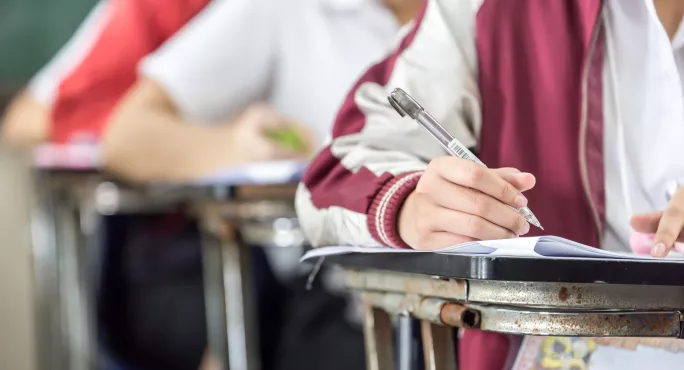Adjusting next year’s GCSE and A level grades by region is one of the options being considered by exam boards to mitigate Covid learning loss, Tes can reveal
The option was touted yesterday by Labour shadow education secretary Kate Green who used a Tes interview to call for a “regional dimension” to the way 2021 exam results “are norm-referenced”.
Now the head of the UK’s largest school exam board has disclosed that regional “special consideration” is one of the options under discussion.
Exclusive: GCSE 2021 grading ‘needs to be regional’
Plea: Change GCSEs 2021, say students ‘drowning in anxiety’
Exclusive: One in three schools hit by Covid this term
Exams: Ofqual looking at multiple choice and mocks
Grading by region would be a way of trying ensure students in areas hardest-hit by the coronavirus are not disadvantaged by the pandemic.
Colin Hughes, AQA exam board chief executive, revealed to Tes what was being considered as exam chiefs work to come up with a solution for next year’s GCSEs and A levels by the end of the month.
Special consideration for regions hit ‘really hard’
“One of the things that’s being talked about is the notion that we could apply some kind of regional special consideration,” he said. “So this particular region was hit really hard or even this particular school had it really hard.”
At the moment boards like AQA sometimes give special consideration to candidates “disadvantaged due to illness or unavoidable circumstances” by adjusting their marks.
Mr Hughes said the idea of giving special consideration to entire regions “seems attractive on the surface”.
But he warned: “The reality is that - how are you actually really going to measure that across space?
Would regional exam grades be fair?
“The other thing is, if you did it regionally, is it fair that in order to do something for students in a rundown inner city area comprehensive and just down the road there’s a fantastic private school and those students will get bumped up from a B to an A? Is that fair? Is that the right outcome?”
But there is growing pressure for next year’s GCSEs and A-levels to recognise the huge geographical disparities in the way Covid has hit education.
Yesterday a Tes investigation revealed the proportion of schools with coronavirus cases this term ranged from 94 per cent in Middlesbrough to just 6 per cent in the Isle of Wight.
Leaders in the North have called for exams to be scrapped altogether, with students “drowning in anxiety” warning that the three week delay will not be enough.
Call on Ofqual to stop grades being blighted by Covid
And this week the head of a leading northern academy chain called for regional grading, saying Ofqual should “guarantee that there will be no difference in the proportion of good grades awarded in areas that are blighted by Covid and those where there has been little disruption”.
Hamid Patel, Star Academies chief executive, added: “They could achieve this by comparing exam marks only with peers within similarly affected parts of the country.”
But if Mr Hughes’ reservations about the fairness of grading by entire regions are shared by Ofqual and the other exam boards, then the idea may be a non starter.
The AQA chief also warned that the same question of fairness would come up if special consideration was applied at school rather than regional level to counter Covid disruption.
There would be comparatively advantaged students getting a boost to their results that less advantaged candidates in other schools missed out on.
‘Just not manageable’
“That same argument applies in microcosm too so exactly the same effects would happen at school level,” Mr Hughes said. “So you have to take it right down to individual level.
“We’re talking about 600,000 students, it’s just not manageable, you simply can’t do that in a fair way.”
An Ofqual spokesperson said: “We are continuing to discuss contingency options for all likely scenarios with school and college leaders, and other stakeholders.
“We will provide advice to the government before it determines and confirms contingency arrangements for 2021 with the sector this month.
“We are also considering ways in which we can make the prospect of exams a little less daunting for students as we recognise they will have missed out on some teaching and learning and know this varies by individual, school, college and region of the country.
“More about our approach is set out in this letter from acting chief regulator Glenys Stacey to education secretary Gavin Williamson.”





